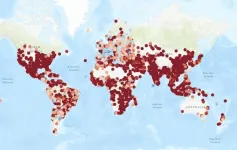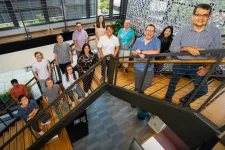(Press-News.org) What: West African genetic ancestry was associated with increased prostate cancer among men living in disadvantaged neighborhoods but not among men living in more affluent neighborhoods, according to a new study led by researchers at the National Institutes of Health (NIH). The findings suggest that neighborhood environment may play a role in determining how genetic ancestry influences prostate cancer risk. The study was published Sept. 16, 2024, in JAMA Network Open.
In the United States, most Black Americans have West African genetic ancestry, the researchers noted. Previous studies have shown that West African genetic ancestry is linked to increased prostate cancer risk among Black men, whose risk is higher than that of any other U.S. population group. However, it is unclear whether additional factors play a role in determining this ancestry-related risk.
To explore how the neighborhood environment and West African genetic ancestry may act together in influencing prostate cancer risk, researchers at NIH’s Center for Cancer Research at the National Cancer Institute (NCI) conducted a study with long-term follow-up that included 1,469 self-identified Black and White men from the greater Baltimore area. The researchers determined the men’s West African ancestry through genetic markers and neighborhood socioeconomic status through factors such as unemployment rate, income level, and percentage of households in poverty.
The researchers then examined the combined association of this ancestry and the neighborhood environment with prostate cancer risk and found that West African genetic ancestry was associated with prostate cancer risk among men living in disadvantaged neighborhoods but not among those living in more affluent areas.
The researchers posited that the increased ancestry-related risk in disadvantaged neighborhoods may be due to chronic stress—such as from racial profiling, housing discrimination, and exposure to violence—which can affect the immune system and cause high levels of inflammation, in turn promoting tumor growth.
Who: Stefan Ambs, Ph.D., M.P.H., Center for Cancer Research, National Cancer Institute
The Study: “West African Genetic Ancestry and a Deprived Neighborhood and Prostate Cancer” appears September 16, 2024, in JAMA Network Open.
###
About the National Cancer Institute (NCI): NCI leads the National Cancer Program and NIH’s efforts to dramatically reduce the prevalence of cancer and improve the lives of people with cancer. NCI supports a wide range of cancer research and training extramurally through grants and contracts. NCI’s intramural research program conducts innovative, transdisciplinary basic, translational, clinical, and epidemiological research on the causes of cancer, avenues for prevention, risk prediction, early detection, and treatment, including research at the NIH Clinical Center—the world’s largest research hospital. Learn more about the intramural research done in NCI’s Center for Cancer Research. For more information about cancer, please visit the NCI website at cancer.gov or call NCI’s contact center at 1-800-4-CANCER (1-800-422-6237).
About the National Institutes of Health (NIH): NIH, the nation's medical research agency, includes 27 Institutes and Centers and is a component of the U.S. Department of Health and Human Services. NIH is the primary federal agency conducting and supporting basic, clinical, and translational medical research, and is investigating the causes, treatments, and cures for both common and rare diseases. For more information about NIH and its programs, visit nih.gov.
END
(Santa Barbara, Calif) — Pregnancy is a transformative time in a person’s life where the body undergoes rapid physiological adaptations to prepare for motherhood — that we all know. What has remained something of a mystery is what the sweeping hormonal shifts brought on by pregnancy are doing to the brain. Researchers in Professor Emily Jacobs’ lab at UC Santa Barbara have shed light on this understudied area with the first-ever map of a human brain over the course of pregnancy.
“We wanted to look at the trajectory of brain changes specifically within the gestational window,” said Laura Pritschet, lead ...
[Vienna, September 13 2024] – The 15-minute city, a concept where essential services are accessible within a 15-minute walk or bike ride, has become increasingly popular in urban planning in recent years. This is because it offers solutions to several pressing challenges in urban areas, such as traffic, pollution, social isolation, and quality of life. With more than half of the world's population now living in cities—and this figure steadily increasing—these issues are becoming ever more critical.
In a recent study, published ...
The CLINICAL24 campaign will see SelectScience partner with a variety of organisations, clinical laboratories and industry brands, to raise awareness of the role of clinical professionals, and those who support them.
As part of the partnership, both organisations will share updates and content of interest to their audiences and AMI will supply speakers for SelectScience’s upcoming Clinical Summit in March 2025.
Global interdisciplinary community
AMI nurtures and engages a global interdisciplinary community, providing opportunities for collaboration, making advancements in, and through, applied microbiology.
“We ...
September 16, 2024—(BRONX, NY)— The National Cancer Institute-designated Montefiore Einstein Comprehensive Cancer Center (MECCC) has announced the new Marilyn and Stanley M. Katz Institute for Immunotherapy for Cancer and Inflammatory Disorders. Xingxing Zang, Ph.D., an international leader in developing novel immunotherapies, has been named its inaugural director.
“Our goal is to be at the forefront of developing novel immunotherapy technologies and advancing them into ...
New research has answered the mystery of how the Crystal Palace in London, which at the time was the world’s largest building, was constructed in only 190 days.
The study, led by Professor John Gardner of Anglia Ruskin University (ARU) in Cambridge, England, has discovered that the Crystal Palace was the first building known to have made use of a standard screw thread – something that’s now taken for granted in modern construction and engineering.
Completed just in time for the start ...
The importance of disorder in physics is only matched by the difficulty to study it. For example, the remarkable properties of high-temperature superconductors are greatly affected by variations in the chemical composition of the solid. Techniques that enable measurements of such disorder and its impact on the electronic properties, such as scanning tunnelling microscopy, work only at very low temperatures, and are blind to these physics near the transition temperature. Now, a team of researchers of the Max Planck Institute for the Structure and Dynamics of Matter (MPSD) in Germany and Brookhaven National ...
FRANKFURT. In January 2024, 16 Frankfurt-based research institutions joined forces to set up the “Frankfurt Alliance”, made up of Goethe University Frankfurt and several non-university research institutions. With the aim of visualizing at an event held in the heart of the Main metropolis both the strength and the diversity of research conducted in the science city of Frankfurt and the larger Rhine-Main region, including its importance for society, the alliance invites you to the first “Science Festival”, held
on Saturday, September 28, from 10 a.m. to 7 p.m.
at Roßmarkt
in ...
The Alliance for Clinical Trials in Oncology today announced final results will be presented at ESMO 2024 from CABINET (A021602), a phase III trial evaluating cabozantinib compared with placebo in two cohorts of patients with previously treated neuroendocrine tumors: one cohort of patients with advanced pancreatic neuroendocrine tumors (pNET) and a second cohort of patients with advanced extra-pancreatic NET (epNET). The study met the primary objective for each cohort, demonstrating that cabozantinib provided dramatic improvements in median ...
To build upon a quarter-century of world-renowned research in zoonotic viral diseases, X.J. Meng has been rewarded with a prestigious National Institutes of Health (NIH) Method to Extend Research in Time (MERIT) Award – the first awarded to Virginia Tech.
“This is a huge honor and privilege,” said Meng, University Distinguished Professor of Molecular Virology in the Virginia-Maryland College of Veterinary Medicine and a member of the National Academy of Sciences. “It is really gratifying to know ...
By Benjamin Boettner
(BOSTON) — Researchers at the Wyss Institute for Biologically Inspired Engineering at Harvard Universityreceived a contract for up to $12M from the Defense Advanced Research Projects Agency (DARPA)’s new SHIELD program. The SHIELD (Synthetic Hemo-technologies to Locate and Disinfect) program aims to develop a prophylactic treatment that can be broadly administered to trauma victims in combat casualty care scenarios to rapidly clear multiple bloodborne bacterial and fungal pathogens, limit morbidity and mortality, and protect recipients for up to seven days.
Blood ...





